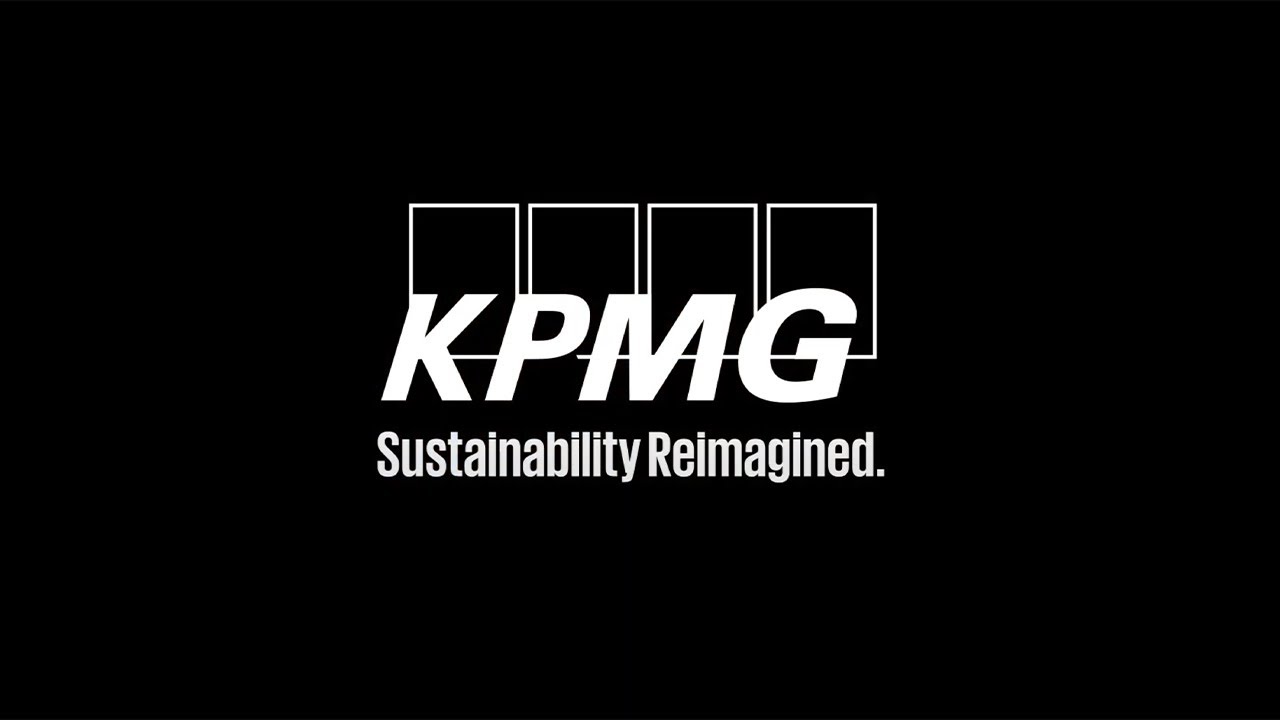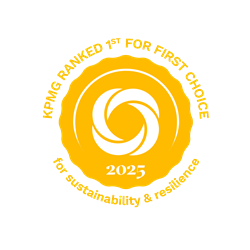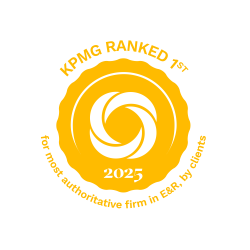


KPMG recognizes the critical role sustainability plays in driving long-term business success.
We offer value-protecting and value-creating approaches to help you navigate evolving market dynamics and complex regulatory landscapes. Our sustainability services are designed to drive innovation and growth, reduce operational costs, increase business resilience, strengthen competitive advantage, and support customer needs.
By harnessing sustainability, organizations can transform today’s uncertainties into tomorrow’s opportunities.
This is Sustainability Reimagined.

Our approach to sustainability drives innovation, growth, and resilience – leaving a positive impact on our communities, organizations, and the world around us. Together, we can unlock opportunities that benefit us all.
Maura Hodge
US Sustainability Leader

KPMG was ranked No.1 in Source’s annual global survey of end users of consulting services. Source’s customers include every single one of the world’s biggest 20 consulting firms and is the leading provider of research, data, and strategic advice about the global management consulting industry. For more information please visit: www.sourceglobalresearch.com

Consulting by clients for: regulatory-driven work, operational improvement, and Data & analytics.

Transformative Reporting: The Power of Collaborative Innovation in Sustainability
Connected, intelligent reporting creates value by reducing costs, utilizing AI, enhancing decision making, and preparing for compliance.

Managing sustainability data in 2025: From Fragmented to Strategic
Using sustainability data strategically can preserve and create value.

From Ambition to Action: Reflections on the theme of COP30
The power of COP is that it generates and celebrates collective action on practical solutions.

Time to Shift Gears – From Compliance to Competitive Edge
Business leaders must act decisively to leverage sustainability data or risk falling behind competitors.

AI and Sustainability
KPMG surveyed 350 executives globally to understand how their businesses are balancing AI and sustainability ambitions.

Sustainability Assurance Maturity: A New Era for Climate Action in the US and around the world
Reflections on the KPMG ESG Assurance Maturity Index.

Beyond Words: 3 Ways Climate Transition Plans Drive Action

Top 5 Things Companies Are Doing to Navigate Sustainability in Uncertain Times

Five Ways to Unlock More Value from Climate Risk Assessments
Five Ways to Unlock the Full Value of Climate Risk Assessments

KPMG at Greenbiz 2026
KPMG is proud to be a Premier Sponsor of Greenbiz 2026, the premier event for sustainable business leaders.

December 4, 2025 | The Future of Sustainability Reporting: Unpacking the Revised ESRS and CSRD for US Companies
Webcast that talks through the ESRS changes with what it means for US companies

November 19, 2025 | Navigating Australia's Climate Disclosure Requirements: A Guide for US-Based Companies
For US-based companies with Australian operations

Climate Week NYC
KPMG is proud to be a Silver Sponsor of New York Climate Week (NYCW)

Unlocking the Full Value of Climate Risk Assessments
With California’s Climate Disclosure Rules requiring initial climate-related financial risk disclosures by January 1, 2026, many companies are refreshing their TCFD-aligned climate risk assessments.Join us for a practical and forward-looking session designed to help companies unlock the full value of climate risk assessments.We’re excited to feature US Foods, who will share their approach to assessing climate risk, the value they’ve unlocked through this process, and how they’re leveraging these insights to inform disclosures and support broader business strategy.

Beyond Compliance: Unlocking opportunity through value chain due diligence

May 21, 2025 | The first wave of ESRS reporting
Join us for a webcast on 21 May 2025, where KPMG professionals will share practical takeaways from the first wave of ESRS reporting and dive into thought-provoking questions around how impact ties into financial materiality.

What does California climate risk reporting look like?
In this webcast, our specialists take a deeper look at the TCFD reporting required under California’s climate laws.

The Impact of Ai on Sustainability and ESG
Join us for a dynamic discussion on the pivotal role of artificial intelligence (AI) in shaping Environmental, Social, and Governance (ESG) metrics and driving sustainability initiatives.
KPMG can help you define a financially efficient strategy to implement climate, circularity and nature initiatives, creating long-term value for your business in a low-carbon economy
Contact Mark Golovcsenko to learn more
KPMG can help you define a financially efficient strategy to implement climate, circularity and nature initiatives, creating long-term value for your business in a low-carbon economy
Contact Mark Golovcsenko to learn more
KPMG can help you embed sustainability into your strategy and organization, using it as a driver of long-term value.
Contact Mark Golovcsenko to learn more
KPMG can help you embed sustainability into your strategy and organization, using it as a driver of long-term value.
Contact Mark Golovcsenko to learn more
KPMG can help you identify risks and unlock value in mergers, acquisitions, and divestitures by incorporating sustainability and environmental, health and safety (EHS) considerations, tailored to your industry sector, throughout the deal lifecycle. Our approach also includes developing and supporting you with implementation of a strategic roadmap of integration activities following a transaction.
KPMG can help you identify risks and unlock value in mergers, acquisitions, and divestitures by incorporating sustainability and environmental, health and safety (EHS) considerations, tailored to your industry sector, throughout the deal lifecycle. Our approach also includes developing and supporting you with implementation of a strategic roadmap of integration activities following a transaction.
KPMG can help you navigate your sustainability reporting with agility. Our expertise in identifying and harnessing the right data and our ability to leverage both existing and advanced enterprise technologies enables us to deliver compliance- and audit-ready reporting alongside strategic analytics and insights that are tailored to your specific needs.
Contact Tegan Keele to learn more
KPMG can help you navigate your sustainability reporting with agility. Our expertise in identifying and harnessing the right data and our ability to leverage both existing and advanced enterprise technologies enables us to deliver compliance- and audit-ready reporting alongside strategic analytics and insights that are tailored to your specific needs.
Contact Tegan Keele to learn more
KPMG can help you with your sustainability reporting, leveraging our deep expertise and extensive experience in the field. We have a thorough understanding of all major sustainability reporting frameworks, enabling us to provide extensive guidance tailored to your specific needs. Our robust international network helps ensure that we deliver consistently high-quality support across global markets. Additionally, our close relationships with regulators allow us to offer valuable insights into regulatory developments and expectations. You can rely on KPMG for informed, expert assistance in navigating the complexities of sustainability reporting.
Contact Paul Nap to learn more
KPMG can help you with your sustainability reporting, leveraging our deep expertise and extensive experience in the field. We have a thorough understanding of all major sustainability reporting frameworks, enabling us to provide extensive guidance tailored to your specific needs. Our robust international network helps ensure that we deliver consistently high-quality support across global markets. Additionally, our close relationships with regulators allow us to offer valuable insights into regulatory developments and expectations. You can rely on KPMG for informed, expert assistance in navigating the complexities of sustainability reporting.
Contact Paul Nap to learn more
KPMG can help you go beyond compliance to enhance trust, mitigate risk, and create value. Our sustainability assurance services include limited or reasonable assurance of greenhouse gas emissions, green/social bond use of proceeds, GRI and SASB reports, and management-developed KPIs.
Contact Corinne Dougherty to learn more
KPMG can help you go beyond compliance to enhance trust, mitigate risk, and create value. Our sustainability assurance services include limited or reasonable assurance of greenhouse gas emissions, green/social bond use of proceeds, GRI and SASB reports, and management-developed KPIs.
Contact Corinne Dougherty to learn more
In today’s rapidly evolving regulatory environment, staying informed about new Presidential Executive Orders (EOs) and related directives is more crucial than ever. KPMG can help you navigate these complex policy requirements and support a continuous response with AI-enabled monitoring to drive compliance, mitigate risks, and foster desired outcomes for clients. Read more here:
In today’s rapidly evolving regulatory environment, staying informed about new Presidential Executive Orders (EOs) and related directives is more crucial than ever. KPMG can help you navigate these complex policy requirements and support a continuous response with AI-enabled monitoring to drive compliance, mitigate risks, and foster desired outcomes for clients. Read more here:
KPMG delivers specialized sustainability services for the Consumer & Retail sector, including sustainable sourcing and supply chain resilience roadmaps, waste reduction initiatives, and circular strategies. Our expertise assists companies in positioning for cost takeout opportunities, market capture, and business resiliency.
Contact Blythe Chorn to learn more
KPMG delivers specialized sustainability services for the Consumer & Retail sector, including sustainable sourcing and supply chain resilience roadmaps, waste reduction initiatives, and circular strategies. Our expertise assists companies in positioning for cost takeout opportunities, market capture, and business resiliency.
Contact Blythe Chorn to learn more
KPMG provides tailored sustainability services for the Healthcare and Life Sciences (HCLS) sector, focusing on areas such as environmental compliance, sustainable healthcare practices, and reducing the carbon footprint of medical supply chains. Our solutions help HCLS organizations enhance their sustainability performance while ensuring adherence to industry-specific regulations and standards.
Contact Kirk Caron to learn more
KPMG provides tailored sustainability services for the Healthcare and Life Sciences (HCLS) sector, focusing on areas such as environmental compliance, sustainable healthcare practices, and reducing the carbon footprint of medical supply chains. Our solutions help HCLS organizations enhance their sustainability performance while ensuring adherence to industry-specific regulations and standards.
Contact Kirk Caron to learn more
KPMG provides targeted sustainability services for the Industrial Manufacturing sector focusing on energy efficiency, waste minimization, and sustainable supply chain management. Our solutions help manufacturers improve environmental performance and comply with emerging standards while reinforcing core operations and continuous improvement.
Contact Josh Hesterman to learn more
KPMG provides targeted sustainability services for the Industrial Manufacturing sector focusing on energy efficiency, waste minimization, and sustainable supply chain management. Our solutions help manufacturers improve environmental performance and comply with emerging standards while reinforcing core operations and continuous improvement.
Contact Josh Hesterman to learn more
KPMG offers strategic sustainability services for the Private Equity sector, including due diligence, portfolio climate risk assessments, and strategies for managing risk and adapting operations to yield a more climate resilient portfolio. Our expertise supports private equity firms in integrating sustainability considerations into their investment processes and driving portfolio value creation through strategic energy management, renewables, supply chain and circularity and fleet transition.
Contact Liz Ming to learn more
KPMG offers strategic sustainability services for the Private Equity sector, including due diligence, portfolio climate risk assessments, and strategies for managing risk and adapting operations to yield a more climate resilient portfolio. Our expertise supports private equity firms in integrating sustainability considerations into their investment processes and driving portfolio value creation through strategic energy management, renewables, supply chain and circularity and fleet transition.
Contact Liz Ming to learn more
At KPMG, we help Technology, Media, and Telecommunications (TMT) companies embed sustainability at the heart of their strategy, operations, and stakeholder engagement. Our multidisciplinary sustainability services are tailored to address the distinct challenges and opportunities facing TMT organizations in a dynamic regulatory, investor, and consumer landscape.
We guide clients through the full sustainability journey — from shaping impactful strategies and setting ambitious targets, to decarbonization initiatives, climate risk and resilience, advancing circular economy practices, and building responsible supply chains. Our expertise also ensures transparent reporting and disclosure, helping TMT companies meet evolving expectations while unlocking long-term value and resilience.
Contact Marcus Leach to learn more
At KPMG, we help Technology, Media, and Telecommunications (TMT) companies embed sustainability at the heart of their strategy, operations, and stakeholder engagement. Our multidisciplinary sustainability services are tailored to address the distinct challenges and opportunities facing TMT organizations in a dynamic regulatory, investor, and consumer landscape.
We guide clients through the full sustainability journey — from shaping impactful strategies and setting ambitious targets, to decarbonization initiatives, climate risk and resilience, advancing circular economy practices, and building responsible supply chains. Our expertise also ensures transparent reporting and disclosure, helping TMT companies meet evolving expectations while unlocking long-term value and resilience.
Contact Marcus Leach to learn more






Why organizations should act now to help protect their people from burnout


A practical guide for businesses in driving towards their sustainability goals


Insights into the EU Taxonomy disclosures of 291 European entities.


EFRAG proposes revised standards to reduce the reporting burden


The laws require reporting about climate risks and GHG emissions for all US companies in scope – whether public or private. With reporting set to begin on January 1, 2026, we keep you up to date with the latest news.


US companies could be impacted by sustainability reporting and due diligence requirements in the EU – notably the Corporate Sustainability Reporting Directive (CSRD) and Corporate Sustainability Due Diligence Directive (CSDDD).


In this episode, we will hear from Simon Weaver, Global Head of ESG Advisory, KPMG International and Partner, KPMG in the UK and Fiona Watson, Vice President Corporate Performance & Accountability, WBCSD — who will share insights and reflections on integrating sustainability into financial valuations.


Q1 2025 marked the release of the first wave of sustainability statements prepared under ESRS, coinciding with the European Commission’s release of its first set of Omnibus proposals.


Linking sustainability metrics to board members’ pay.


ESG transition is here to stay, albeit with simplified reporting and more focus on decarbonisation


Limiting ESRS and EU Taxonomy requirements to the largest companies


2024 Sustainability Organization Survey




Meet KPMG climate leaders at this year's climate events to collaborate on building a more sustainable future for all.


Explore how artificial intelligence is unlocking positive climate outcomes and accelerating the energy transition.


In November 2025, KPMG professionals will be present in São Paulo and at COP30 in Belém, Brazil, which brings together world leaders, policymakers, industry innovators, and environmental activists to exchange ideas and formulate strategies to tackle climate change.
Sign up to receive sustainability insights, information, and event invitations from KPMG Sustainability.
Connect with our partners and other thought leaders as they share insights on emerging sustainability issues.

Maura Hodge, KPMG US Sustainability Leader has been honored as a Gold Stevie Awards winner in The 22nd Annual International Business Awards® for Sustainability Hero of the Year – in Canada and the U.S.A.
More than 3,800 nominations from organizations of all sizes in 78 nations and territories were submitted this year for consideration in hundreds of categories, from PR Campaign of the Year to Best Entrepreneur, Sustainability Initiative of the Year, Technology Categories, and more. View the full list of sustainability category winners here.
We're dedicated to helping you leverage the power of sustainability to transform your business





